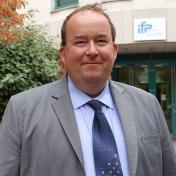
Supported by TotalEnergies in association with Fondation Tuck
Supported by TotalEnergies in association with Fondation Tuck

This publication builds on our previous post on the “Poles of Acceptability” and now presents a summary of Chapter 2 of Florian Auclair’s thesis: how can these dynamics be investigated in real-world…

🎓 The CarMa Chair is excited to announce that Romain Presty will be defending his PhD thesis, titled “Modeling Large-Scale Carbon Dioxide Removal Deployment: From Research to Market”, on March 2nd at…
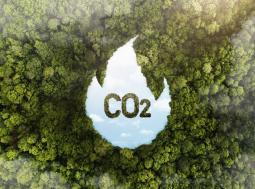
Siwar Saadaoui continues her journey with us, starting her postdoctoral research under the CarMa Chair at IFPEN on February 10th, 2026. 🎉
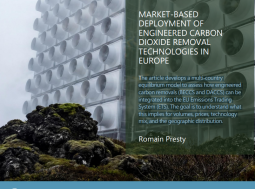
This study uses a multi-country equilibrium model to explore how engineered carbon removals, such as BECCS and DACCS, can be integrated into the EU Emissions Trading System (ETS). It examines the…
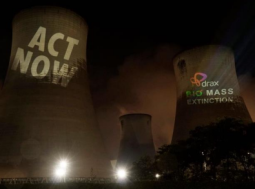
Social acceptability is increasingly recognized as a key factor for the success of the low-carbon transition. To explore how this parameter influences the deployment of BECCS, Florian Auclair…

On December 9th, 2025, Siwar Saadaoui defended her PhD thesis, which proposes a comprehensive and spatially explicit framework for assessing the sustainable deployment of dedicated energy crops. Her…
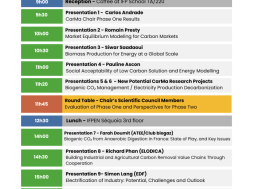
We were pleased to host our annual seminar at IFP School, chaired by the members of our Scientific Council: Roger Aines, Sabine Fuss, and Volker Sick. Our students Romain Presty, Siwar Saadaoui, and…

On November 12th, 2025, Pauline Ascon joined the CarMa research team to begin her doctoral research at IFPEN and at the Center for Applied Mathematics of Mines Paris (CMA), under the supervision of…
Our aim is to create a center of excellence on the theme of carbon management and negative CO2 emissions, with the following roles:

To contribute to the training of a new generation of international researchers and experts who will develop economically acceptable approaches and technologies in line with societal expectations, to maintain in the long term below 450 ppm the CO2 content of the atmosphere.
> Training by & to Research

To develop skills and pedagogical tools in the fields of carbon dioxide management and negative emissions technologies.
> Education

To promote research results and provide educational tools widely available to raise public awareness and enrich public debate on the need to limit the CO2 content of the atmosphere to 450 ppm in the long term.
> Dissemination
Ultimately, the Chair will integrate the work of 7 doctoral and 5 post-doctoral researchers and will also call on several scientific visitors.
The provisional program of the Chair's Research Activities includes a number of doctoral and post-doctoral students as well as a few internships at bac+5 level to support the work of doctoral and post-doctoral students.
It was initially planned to have 5 theses and 6 post-doctoral fellows over the 5 years with the following approach:
Post-doctoral fellowships of 12 to 24 months each, distributed as indicated in the table below. The idea is to rely on these confirmed researchers throughout the duration of the Chair with a major effort at the start and then upon completion of the first batch of theses in order to prepare the synthesis phase of the Chair.
Thesis work increases in strength from the second year with 2 to 3 subjects in parallel, this effort being renewed in the third year, thus enabling all doctoral students to present their dissertations throughout the duration of the Chair.
Internship work lasting between 4 and 6 months each to support the work of doctoral and post-doctoral students. Four internships are planned.
These research objectives in terms of the number of thesis and post-doctoral works remain flexible according to the priorities that will be established by the Chair governance.
As noted on our home page, the range of topics covered by the Chair is very broad: from natural carbon sinks to engineered solutions, including direct capture of carbon dioxide from the atmosphere, the use of biomass energy, both of which coupled with CCS and approaches to sequestering carbon in soils or exploiting the weathering process in rocks. Beyond technical issues, scientific obstacles and economic challenges, the Chair's work also encompasses environmental and societal aspects in the broad sense (societal perception/acceptability, etc.). The challenge is to "open the door" to rational, pragmatic and socially accepted responses that can be implemented by 2050 hoping to achieve carbon neutrality at the earliest in the second half of the 21st century.
In order to accomplish these goals, it has been decided to devote the first year of the Chair to taking stock of the situation and carrying out an in-depth analysis of the issue of negative emissions. The objective of this first stage is to identify the major areas to be investigated thereafter and the major bottlenecks to be overcome.
Three topics have been selected as priorities: a PhD research topic and two post-doctoral research works:
Emma Jagu joined IFP School in October 2019 to start her PhD and Dr. Ancuta Isbasoiu joined IFPEN in January 2020 to work on the second topic. On July 2020 Dr. Andrei Carlos Briones Hidrovo joined IFPEN to work on the environmental assessment of negative emissions technologies.
At end of Year 1, the CarMa Chair governance makes the choise to mainly focuss its program research activity on BECCS, extending its initial works to societal aspects of the deployement of BECCS, integrating the temporal dimension in LCA analyses while also considering the possible "competition" between land-use for food and land-use for biomass energy.
Three new topics have been selected:
Because of the sanitary situation and its consequences we unfortunately had some recruiting delays. Florian Auclair joined CNRS - UPPA (UMR TREE) on February 2021 to start his doctoral work on topic PhD 3 and Sibylle Duval-Dachary joined IFPEN in September 2021 to start PhD 2 topic. Dr. João Pedro Domingues joined the EcoSys Joint Research Unit from INRAE - Agro ParisTech located in Thiverval-Grigon (France) on March 2022 to start his Post-Doc 3 research topic.
Two topics have been identified following the path of the two first years. The first one investigates TIMES integrated assessment models to assess the role of Negative Emissions Technologies in the decarbonization of energy-intensive industries. The second one aims at continuing the work achieved during years 1 and 2 in the frame of the work of Dr Ancuta Isbaosiu (Postdoc 1).
Dr Carlos Eduardo Andrade Sandoval joined IFPEN in October 2021 and the recruitment of Postdoc 5 has been postponed to Year-4.
For Year 4, three new research topics have been launched.
PhD 5: Market Equilibrium Modeling for Carbon Dioxide Removal Markets
Siwar Saadaoui joined the Cired Laboratory and Agro ParisTech on November 2022 to start her PhD research (PhD 4) while Romain Presty simustaneously joined the Economics Department of IFP School to also start his research (PhD 5). Solène Chiquier will join the Massachusets Institute of Technology on March 2023 to start her research (Postdoc 6). IFPEN is recruiting postdoc 5.
The Year 5 research program activities align with the continuation of the ongoing program. It has been decided to discontinue postdoctoral projects 6 and 7 in favor of launching a new doctoral research project at IFPEN :
PhD 6: Social acceptability of decarbonization solutions in Europe: implications for prospective modeling and long-term energy planning
Director of the Energy Economics and Management Center
IFP School
Center of Energy Economics and Management
Economist-Foresight
IFP Energies nouvelles
Economics and Environmental Evaluation Department
Chief Scientist of the Energy Program
Lawrence Livermore National Laboratory
(California, USA)
Head of working group Sustainable Resource Management and Global Change
Mercator Research Institute on Global Commons and Climate Change
(Berlin, Germany)
Principal Deputy Assistant Secretary (PDAS) for Office of Fossil Energy and Carbon Management
US Department of Energy
(USA)
Vice-President in charge of international affairs
Institut national de recherche pour l'agriculture, l'alimentation et l'environnement
(Paris, France)